EVER GO HIKING? MOST PEOPLE HAVE TRIED IT AT LEAST ONCE. AND MOST PEOPLE KNOW THAT WHEN HIKING, IT’S OFTEN A GOOD IDEA TO FOLLOW A TRAIL.
One of the most famous trails in the United States is the Appalachian Trail, which runs from Springer Mountain in Georgia, all the way to Mount Katahdin in Maine. The 2200-mile trek is a favorite of hikers all along the east coast. At the northern end of the trail, it connects the highest peaks in the Northeast, in the rugged White Mountains of New Hampshire.
It’s a beautiful trail, but it’s not without its dangers. In fact, a visit to the station atop Mount Washington, New England’s highest peak, reveals that over a hundred and sixty people have perished while hiking the challenging trails on and around that peak. And people continue to be challenged by these mountains today.
So how does this relate to trading? The majority of traders struggle with their trades, and often become casualties of trading, losing everything in an account and knocking them out of the game. While a relatively small percentage of hikers meet their demise on trails, the percentage of traders that didn’t make it are even greater. Some studies show that over 90% of traders struggle to succeed.
And why is this?
For many, it comes down to having the right tools, training and experience. You certainly want to be prepared before taking even a causal hike, with snacks, water, a cell phone, and perhaps more important than anything else: a map.
Whether you’re a hiker or a trader, you need to have a clear understanding of where you are and where you want to be. If you’ve hiked the area before, then you may keep the map in your head, but you still need a map – or at least some help in finding a path from start to finish – and to identify where the possible dangers are.
Likewise, if you’re trading, you need a map, too. There aren’t many but they do exist. You can have a trading map.
Of course, you have to know how to use a map. Firstly, you must know how to translate the map to the trail. On most established hiking trails, markers of some type identify the path. These markers are often painted on trailside trees. Each trail’s markers, known as “blazes”, are painted in a specific color which identifies the trail. On the Appalachian Trail, white paint is used. If there’s more than one trail overlapping for a while, two blazes are marked on trees together, one above the other. In addition to the markers, signposts occasionally identify turning points, sometimes with mile markers to destinations.
What happens when you’re atop a mountain and there are no trees on which to paint the trail blazes? This happens above 4400 feet in the White Mountains, leaving nearly 2000 feet of treeless trails.
So how do they mark the trails without trees? Instead of using trees, trails are marked with piles of rocks, called cairns. These are piles of rocks that mark the trail, separated by about 30 feet or so. Why so close? Because clouds can often obscure vision atop a mountain, and 30 feet usually allows a hiker to make out the next pile of rocks from a cairn.
So if most hikers carry maps and have trail markers and sign posts, why have some people met their fate atop the mountains? While there are many different causes, many of them were caused by the unusual conditions that existed. For example, some people chose to hike at night or in bad weather, when visibility is low.
Hiking at night makes trail blazes really tough to see, especially without a flashlight. And even in daylight, with exceptionally thick cloud cover, you can’t always see the next cairn from the cairn you’re at. In these cases, you send out a person from your party in the direction of where the next cairn is likely to be to try to find it. Knowledgeable hikers will keep the party and the cairn behind them in sight as they seek out the next. Once found, the whole party can move on to the next cairn and repeat.
In a way, trading can be like this. We often find ourselves trading with limited visibility. We enter a position with a goal in mind, but sometimes we struggle to find the path to get there. It may not be obvious where the next trail marker is.
Certainly, we often have very little information to trade with, as far as where price may pause as it hopefully moves toward our expected exit. It’s frustrating to have price held up for some unknown reason before it reaches our goal. This can create bad habits that encourage exiting trades early out of fear and dealing with the unknown. New traders especially will get out too early at a pause point before reaching their target. Had they known in advance that price might hesitate at a point between their entry and target, they are probably more likely to wait it out until they hit their target.
Wouldn’t it be helpful in trading if we had a map with trail markers like our trail hikers have? That is, imagine getting into a trade with a target in mind. With a map, not only would we have the end goal in mind, we would also be able to see in advance the possible price points where our trade is likely to pause.
If you learned that such a tool exists, wouldn’t you want it in your trading toolset?
Base Camp Trading has created just such a tool, and it’s already in use by its customers who are saying again and again, “How did I ever trade in the past without this tool?”
Imagine being in a trade and knowing if price moves beyond point X that it’s likely to continue to point Y. Imagine knowing that as price moves toward a level, that there’s a good possibility that price will remain here for a while, allowing you to take profits just as you reach it? Then you can repurpose those funds for another trade rather than keeping your money tied up in a sideways-moving position.
Imagine knowing in advance of entering a position whether you even want to take a trade based on the number of pause points between you and your goal, so you can find a better use for your funds.
Base Camp Trading’s new Gravity Lines indicator is providing the map that traders need to make much better decisions in their trading decisions. Its features benefit all phases of trading, from deciding on when or whether to enter a trade, when to exit a trade, when to take partial profits, and even when it’s a good time to increase your position size.
So how does Gravity Lines work? Gravity Lines uses a proprietary set of calculations that utilize recent and long-term price action to identify key price points in any market. Gravity Lines provides simple chart annotations that clearly show price points that identify zones where price is likely to go, and perhaps hover for a bit. Or for a long time.
Price levels are laid out right on top of your chart, clearly identifying price levels that are hidden based on recent and longer-term price action. These appear on your chart like a ladder, with likely price targets acting like ladder rungs. You can use Gravity Lines just like a ladder, knowing that price likes to hang out at those rungs. Just like a ladder, once we take a step up or step down, we can move on to the next rung.
GET MQ MZT – BASE CAMP TRADING
The rungs themselves aren’t intended to be exact prices – they’re more of a zone around the levels – but it’s uncanny at times how price pauses or reverses at or very close to a level.
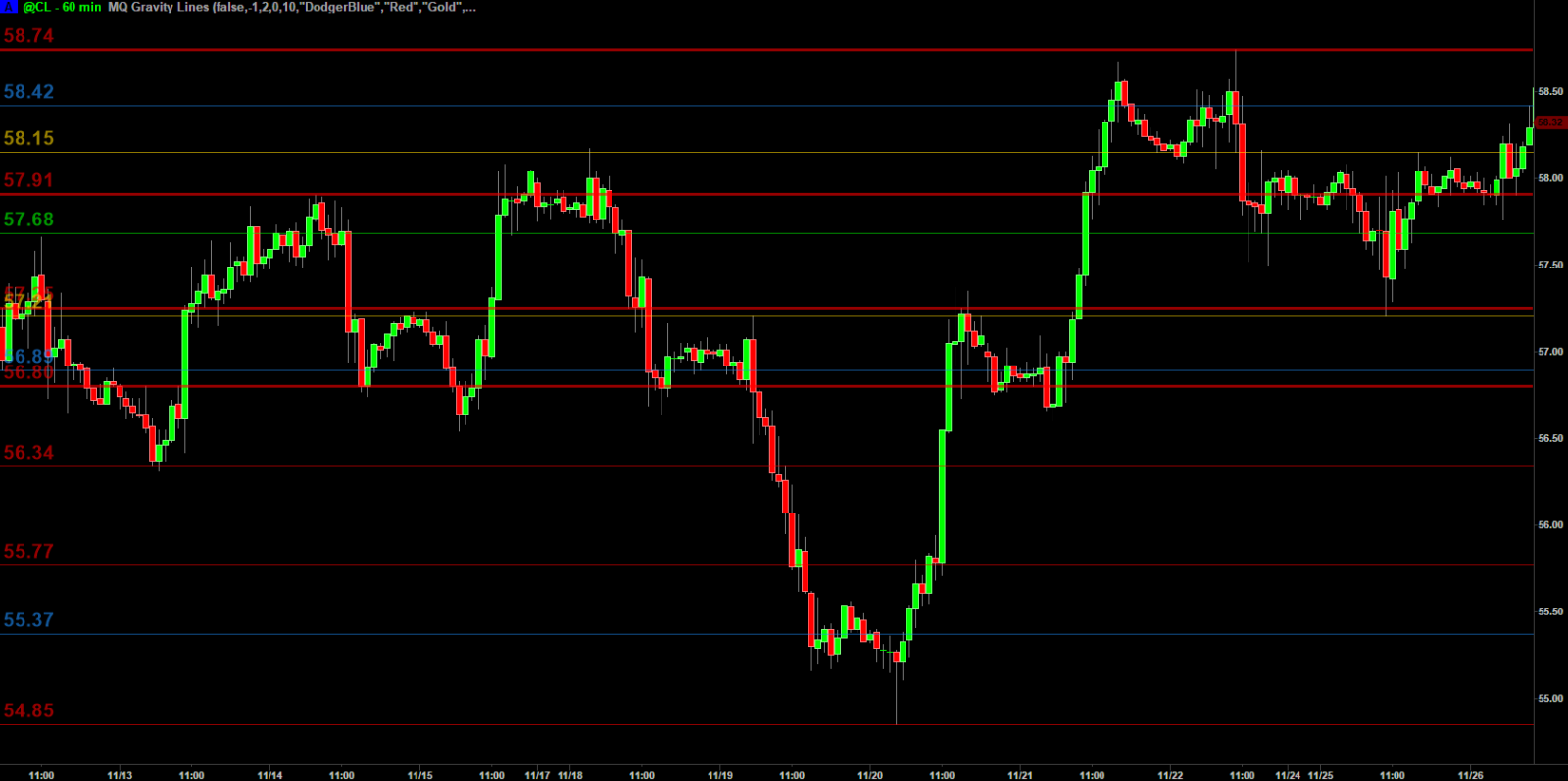
Here’s a snapshot of Gravity Lines in action on an hourly Crude futures chart. You can see how price often pauses and even reverses at or near levels revealed by this powerful indicator. Gravity Lines lays out a map of where price has been and where it’s going.
As we mentioned above, price seems to be magically drawn to move to the next Gravity Lines level once it crosses another. Perhaps these are opportunities to add to your position. They can also be a point where you can take partial profits. You can effectively use the levels as hidden price support and resistance levels that seem to be aligned with price pivots. Gravity Lines isn’t using those price pivots in its calculations – even though a chart makes it appear that it does since they often align so well. Gravity Lines calculations dive deeper into price action, and it’s reassuring to see pivots and pauses aligning with its lines.
For traders who struggle with staying in positions for the larger gains, many traders report that Gravity Lines’ levels give them the courage to stay in a trade longer to finally get those elusive big gains. Somehow our traders find it easier to stay in a trade longer when they see the next price level within reach. It encourages better trading habits.
In a way, Gravity Lines becomes our mountain top guide, providing the cairns in the fog that let us know where the next likely target is as we ascend or descend the mountain. Just like those trail markers identify the path both ahead of us and behind us, Gravity Lines shows you the prices above and below us so we can make more informed trading decisions.
Imagine what It would be like to trek across a mountain without the ability to clearly see. We can all agree that trading is never like hiking on a clear day. We know there are many clouds and obstructions that prevent us from clearly seeing all the obstacles ahead. Gravity Lines lays out the next steps to permit a wise trader to climb whatever mountain they set their mind to. It’s almost like radar penetrating through the clouds to show us the way. And no, there’s no guarantee of success in trading – we all know that. But having the right tools like Gravity Lines can certainly give us an edge as it provides us with information that would otherwise not be seen.
Imagine if you magically appeared atop a mountain and didn’t know about the trail system. That’s what traders are often like, without a knowledge of the hidden information that’s already underlying the market. Imagine the relief you’d find atop a mountain if you finally did find a trail and started to follow it. You can imagine that it would greatly improve your chances of reaching your goals with efficiency, and perhaps with fewer bruises along the way.
And Gravity Lines isn’t just a one-dimensional tool. It’s like a map that automatically configures itself to whatever mountain you choose. It uses several different techniques to help identify useful price levels. It uses and reveals key price action levels, using midpoints, highs, lows, and more. Color coding is used to identify the various levels, as while they all identify key price support and resistance levels, some have additional significance and use.
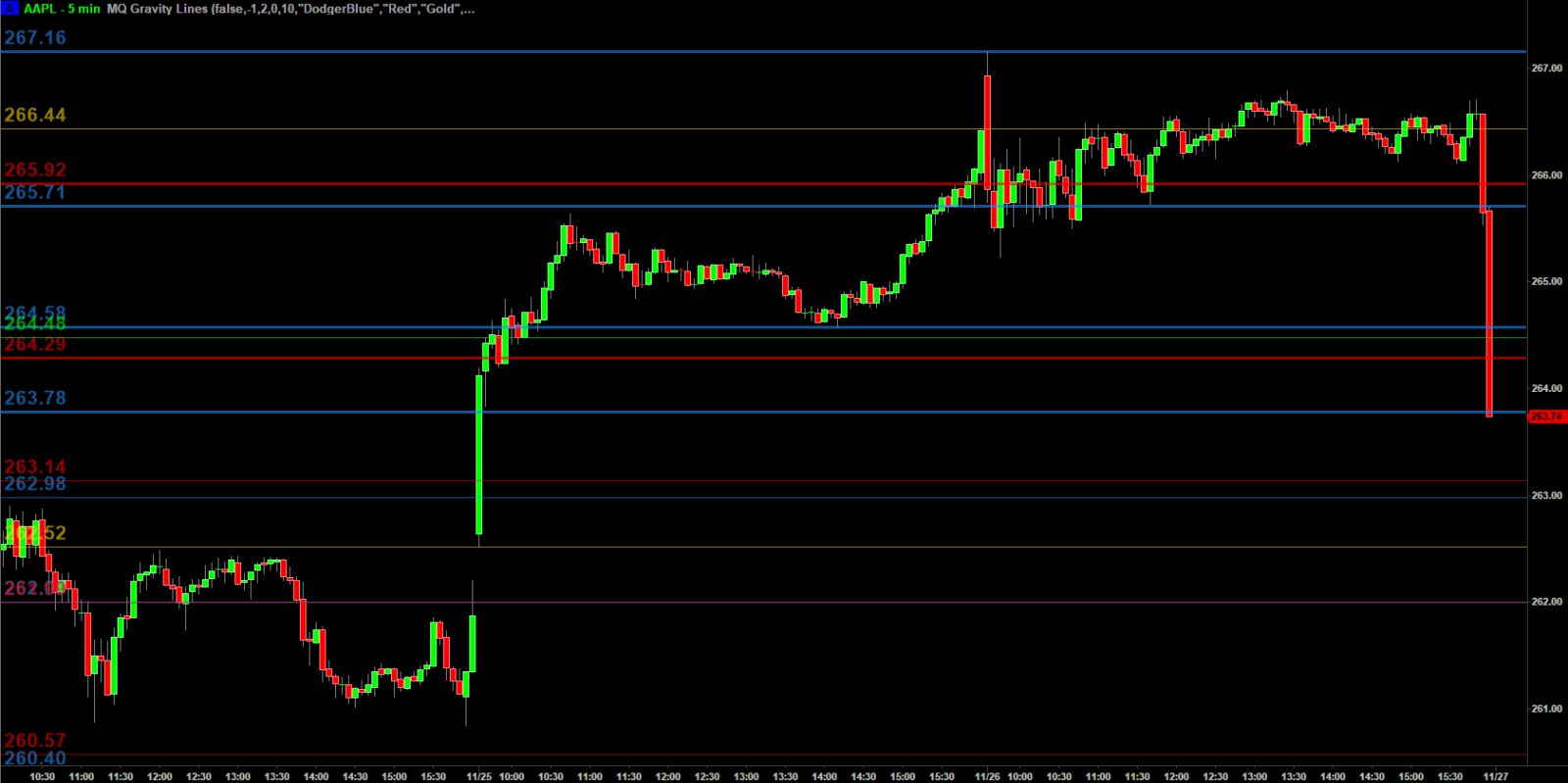
For example, the midpoint level, identified in Gravity Lines as a green line, is almost a magnet to price. Often, we’ll anticipate that price will move toward the green midpoint line. When price is below the green level, we might expect prices to rise. Above it? Then price may be more likely to fall. This happened in the 5 min AAPL chart shown here.
Green and Gold levels identify data derived from the previous day, while our “Ruby” levels utilize alternate timeframe data to derive a longer-term perspective. Sapphire levels are the most flexible and dynamic of the levels, as they can be directed to focus on very short or very long-term timeframes.
What makes Sapphire levels so useful is that they will respond to your direction. This makes Gravity Lines essential for traders of all durations. Whether you are day trading futures or swing trading equities and options, Gravity Lines can adjust to your trading style, while still retaining its accuracy. And this doesn’t require a complex formula or input configuration. In fact, Gravity Lines will automatically adjust to your charts without even changing any of the inputs.
And Gravity Lines is smart enough to let you know when it’s working properly. Gravity Lines compares its own predictions to recent price action to see where it was correct – and it lets you know if it’s doing a good job. This is performed with a feature called “Hot Lines”, where the levels will be automatically annotated as thicker when recent price action is respecting the levels that Gravity Lines has presented. This lets you know right on the display which lines are “proven” and even more likely to be pertinent price points in your trading.
Gravity Lines also plots price levels well above and below the current price so traders can focus on both near- and short-term targets. This again, makes it an ideal tool for short- and long-term traders alike.
If you’ve considered other indicators that might be similar to Gravity Lines, you’ll find that there are few available. Gravity Lines differentiates itself from its sparse competition in several ways. First, it works on all markets, all time frames. It works for almost all chart types, including exotics on most platforms, such as Renko charts.
Why is the ability to work in all markets important? Because it means you can use it on any market symbol – not just a subset that’s offered. This is because Gravity Lines is using price action rather than external inputs to determine its price levels. Avoiding the use of external data points also means you don’t need to update it regularly. No costly subscription is required. Gravity Lines will automatically adjust to a market using its price action history alone.
Most importantly, Gravity Lines is computing its levels based on your trading time frame. That is, it’s using what the market is doing now as a gauge of what it’s likely to do. Gravity Lines is designed this way because it makes more sense to base price movement on what a market’s done recently rather than what it did many years ago. Markets change regularly, and Gravity Lines instantly and continuously reflects those changes.
Let Gravity Lines be your trading GPS!
Gravity Lines is available now on TradeStation, ThinkOrSwim, NinjaTrader 7, NinjaTrader 8 and Sierra/Infinity. You can purchase Gravity Lines, or find out more about it at this link. Note sure yet? You can see how they perform by watching Gravity Lines being used live with a trial membership to Base Camp Trading for just $7.
Don’t be that hiker that wanders off the trail and risks falling off a cliff to their demise. Don’t be a trading statistic! Learn how to see the trail and how to stay on it, with Gravity Lines, and perhaps like many of our traders, you will reach even your highest goals.










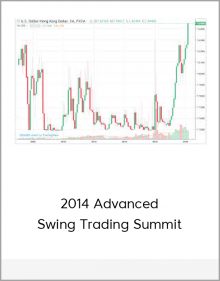



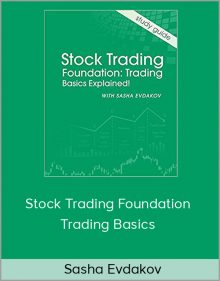






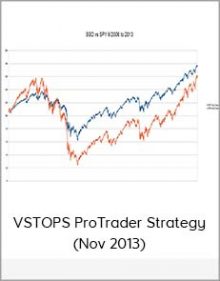



Reviews
There are no reviews yet.